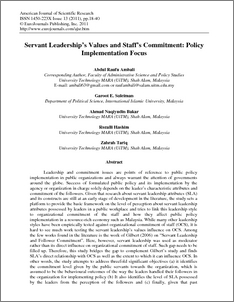Ambali, Abdul Raufu and Eissa, Garoot Suleiman and Bakar, Ahmad Naqiyudin and Hashim, Rozalli and Tariq, Zahrah
(2011)
Servant leadership’s values and staff’s commitment: policy
implementation focus Abdul Raufu.
American Journal of Scientific Research, 13 (1).
pp. 18-40.
ISSN ISSN 1450-223X
![[img]](http://irep.iium.edu.my/style/images/fileicons/application_pdf.png)  Preview |
|
PDF (Servant leadership’s values and staff’s commitment: policy implementation focus Abdul Raufu )
- Published Version
Download (240kB)
| Preview
|
Abstract
Leadership and commitment issues are points of reference to public policy implementation in public organizations and always warrant the attention of governments around the globe. Success of formulated public policy and its implementation by the agency or organization in charge solely depends on the leader’s characteristic attributes andcommitment of the followers. Given that research about servant leadership attributes (SLA)and its constructs are still at an early stage of development in the literature, the study sets a platform to provide the basic framework on the level of perception about servant leadership
attributes possessed by leaders in a public workplace and tries to link this leadership style to organizational commitment of the staff and how they affect public policy
implementation in a resource-rich economy such as Malaysia. While many other leadership styles have been empirically tested against organizational commitment of staff (OCS), it is hard to see much work testing the servant leadership’s values influence on OCS. Among the few works found in the literature is the work of Gilbert (2006) on “Servant Leadership and Follower Commitment”. Here, however, servant leadership was used as moderator rather than its direct influence on organizational commitment of staff. Such gap needs to be filled up. Therefore, this study bridges the gap to complement Gilbert’s study and finds SLA’s direct relationship with OCS as well as the extent to which it can influence OCS. In other words, the study attempts to address threefold significant objectives (a) it identifies
the commitment level given by the public servants towards the organization, which is assumed to be the behavioural outcomes of the way the leaders handled their followers in
the organization for implementing policy (b) It also identifies the level of SLA possessed by the leaders from the perception of the followers and (c) finally, given that past Servant Leadership’s Values and Staff’s Commitment: Policy Implementation Focus 19 researchers have generalized the significant influence of all leadership attributes on
organizational commitment of staff, this study specifically identifies the most servant leader’s value that influences the commitment of the staff towards the organization thereby
facilitating the success of the policies being implemented in public sector. According to the findings of the study, a positive relationship exists between SLA and OCS and the main influential value of servant leadership on OCS is the level of integrity possessed by leaders in the organization. This suggests, among all other characteristic attributes, the hierarchical importance of integrity quality of leaders that can significantly bring public policy implementation to success as compared to other attributes of servant leadership.
Actions (login required)
 |
View Item |


 Download Statistics
Download Statistics Download Statistics
Download Statistics